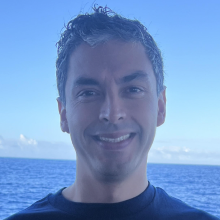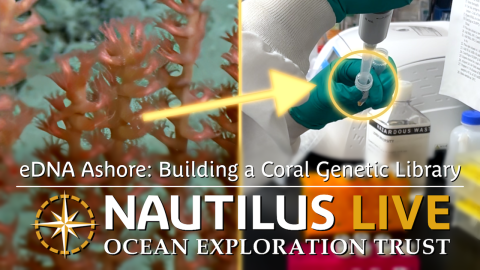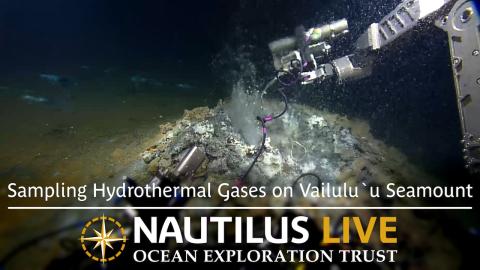
Santiago Herrera
Tell us about your work/ research. What kinds of things do you do?
I specialize in studying deep-sea benthic ecosystems, focusing on how environmental heterogeneity affects biodiversity. By integrating molecular biology, computational biology, and field data collection, I aim to enhance our understanding of marine ecosystems and inform their management and conservation. I frequently participate in oceanographic research expeditions, which often last two to four weeks. On these expeditions, I utilize remotely operated vehicles (ROVs), autonomous underwater vehicles (AUVs), and towed camera systems to collect data and samples from the ocean floor. These expeditions are critical for gathering the primary data needed to understand the complex interactions within deep-sea environments. Once back in the lab, my work involves a detailed analysis of the collected samples. This includes extracting DNA and RNA to study the genetic diversity of benthic organisms and using advanced computational methods to analyze large datasets. I employ molecular techniques to investigate the roles and relationships of different species within their ecosystems. My research is highly interdisciplinary. I collaborate with experts in oceanography, marine chemistry, geology, and engineering. These partnerships allow us to approach complex scientific questions from multiple angles, combining our expertise to develop comprehensive models of oceanic processes and their impacts on marine life.
What sparked your initial interest in your career?
My initial interest in my career began with a deep fascination for the natural world and its hidden mysteries. Growing up, I was always curious about the environment and how living beings functioned. This curiosity led me to pursue a degree in biological sciences, where I discovered the incredible diversity and complexity of marine life. During my undergraduate studies, I took several marine biology and ecology courses, igniting my passion for the ocean. I was particularly intrigued by the deep sea, an area so vast and unexplored that it promised endless opportunities for discovery. The more I learned about it, the more I wanted to contribute to our understanding of this mysterious part of our planet. Participating in a summer research program at the Smithsonian Institution was pivotal in my academic journey. This experience allowed me to work alongside experts in the field, providing hands-on experience with advanced research techniques. The thrill of collecting data from the ocean and analyzing it to uncover new insights solidified my decision to pursue a career in biological oceanography. As I progressed through my studies, I became increasingly interested in how environmental factors influence biodiversity in deep-sea ecosystems. This led me to specialize in deep-sea benthic ecosystems, where I could combine my interests in molecular biology, computational biology, and field data collection. The interdisciplinary nature of this research and the potential to make significant contributions to marine science and conservation further fueled my passion.
Who influenced you or encouraged you the most?
My parents, who taught me the value of knowledge and supported every career decision. And my undergraduate and master's advisor, Dr. Juan Sánchez, who introduced me to ocean research and set an example to follow.
What element of your work/ study do you think is the most fascinating?
The most fascinating element of my work is using advanced underwater vehicles to explore deep-sea ecosystems. These technologies allow me to venture into some of the most remote and unexplored parts of our planet, revealing an alien world teeming with life.
How did you get involved with Ocean Exploration Trust? How did you become part of the expedition team?
I have participated as a shore-based scientist in several OET cruises during the last 14 years. This will be the first time I sail on the Nautilus.
What other jobs led you to your current career?
I worked at a summer camp in the USA in college. This job helped me improve my English which was then vital to develop my academic and research career.
What are your degrees and certifications?
Bachelor of Science in Biology and Microbiology -- Universidad de los Andes, Colombia 2007
Masters of Science -- Universidad de los Andes, Colombia 2009
PhD Biological Oceanography -- Massachusetts Institute of Technology and Woods Hole Oceanographic Institution 2014
What are your hobbies?
SCUBA diving and gardening
What advice would you give someone who wants to have a career like yours?
Get Hands-On Experience: Participate in research projects, internships, and fieldwork opportunities.
Network Actively: Attend conferences, join professional organizations, and connect with other researchers and professionals in your field.
Communicate Your Research: Develop strong communication skills to share your findings with both scientific and public audiences. Writing, presenting, and engaging in outreach are valuable skills.
Stay Resilient: A career in oceanography can be challenging, with long periods at sea and complex research problems. Stay resilient and persistent, and don't be discouraged by setbacks.
Expeditions
Santiago participated in the following Ocean Exploration Trust expeditions:


